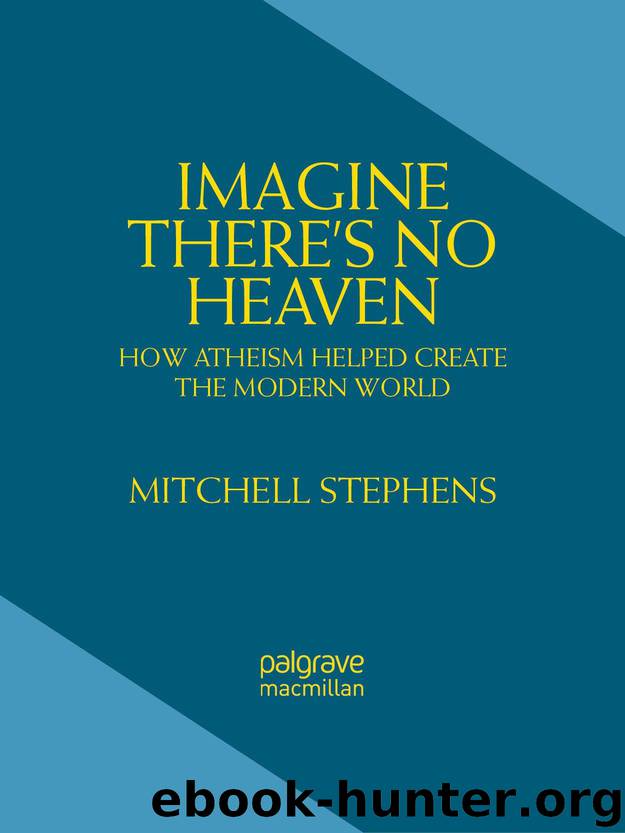Imagine There's No Heaven: How Atheism Helped Create the Modern World by Stephens Mitchell

Author:Stephens, Mitchell [Stephens, Mitchell]
Language: eng
Format: mobi, epub
Publisher: Palgrave Macmillan
Published: 2014-02-25T00:00:00+00:00
11
TO WİPE AWAY THE ENTİRE HORİZON
CREATİNG THE TWENTİETH CENTURY
Speaking the wisdom once they could not think,
Looking emotions once they feared to feel,
And changed to all which once they dared not be
—Percy Bysshe Shelley, Prometheus Unbound1
In 1882, a character in a book by a then obscure German philosopher makes a portentous announcement. The character is described as a “madman.” Initially, this book, like the other books Friedrich Nietzsche is writing, is mostly ignored; only 200 copies sell in four years. The announcement—crucial in my story of the development of atheism—is that “God is dead.”2
The madman proclaims this in a marketplace before, Nietzsche tells us, “many . . . who did not believe in God.” Crowds of that composition had become more common in the last decades of the nineteenth century—
after Mill, after Darwin. The speeches, the debates, the conversations and the writings of proselytizing nonbelievers—more and more open in Europe and America in that century—had also had their effect. Many had weighed the arguments, looked around them and begun to see things Ernestine Rose’s way, Charles Bradlaugh’s way. Together these atheists or agnostics added up to a significant minority—an influential minority.
As Nietzsche’s madman pronounced God dead, Bradlaugh was being reelected to Parliament in Northhampton (though he had not yet been allowed to take his seat). And new, often outspoken disbelievers were appearing. We might gather our own group of them—a group of the makers of the twentieth century—to puzzle out the significance for that century of what was happening to God.
Karl Marx had died, at the age of 64, in London the year after Nietzsche’s book was published. At his sparsely attended funeral, the task facing Marx’s main eulogist, Frederick Engels was arguing for his historical, philosophical and political significance. Engels did not hold back: “On the fourteenth of March, at a quarter to three in the afternoon, the greatest living thinker ceased to think.”3 Engels did not feel called upon to note the absence of any deathbed religious conversion: Karl Marx had forcefully denied the existence of God, and insisted that thought ceases with death, all his adult life.
Both his grandfathers had been rabbis.4 But Marx’s father, Herschel Levi, was a secular man, who became, in stages, Heinrich Marx. When the Prussian government made it impossible for Jews to practice law, Heinrich, a successful lawyer in the old German city of Trier, was forced to switch his religion as well as his name. His conversion was made less painful by the fact that he had stopped believing in the Jewish religion long ago and was now, in actuality, an Enlightenment-loving deist. Karl Marx was born in 1818, just about when Heinrich Marx officially became a Protestant.
Karl was baptized at the age of six. In one surviving school essay the young Marx writes of the “happiness . . . which only one bound unconditionally and childlike to Christ, and through him to God, can know.”5 Such sentiments, whether sincere or not, do not recur.
“Criticism of religion is the premise of all criticism,” Marx wrote in an essay published when he was 26.
Download
Imagine There's No Heaven: How Atheism Helped Create the Modern World by Stephens Mitchell.epub
This site does not store any files on its server. We only index and link to content provided by other sites. Please contact the content providers to delete copyright contents if any and email us, we'll remove relevant links or contents immediately.
| Buddhism | Christianity |
| Ethnic & Tribal | General |
| Hinduism | Islam |
| Judaism | New Age, Mythology & Occult |
| Religion, Politics & State |
Cecilia; Or, Memoirs of an Heiress — Volume 1 by Fanny Burney(31355)
Cecilia; Or, Memoirs of an Heiress — Volume 3 by Fanny Burney(30952)
Cecilia; Or, Memoirs of an Heiress — Volume 2 by Fanny Burney(30909)
The Secret History by Donna Tartt(16675)
Sapiens: A Brief History of Humankind by Yuval Noah Harari(13086)
Leonardo da Vinci by Walter Isaacson(11927)
The Radium Girls by Kate Moore(10923)
Sapiens by Yuval Noah Harari(4560)
The Wind in My Hair by Masih Alinejad(4430)
How Democracies Die by Steven Levitsky & Daniel Ziblatt(4425)
Homo Deus: A Brief History of Tomorrow by Yuval Noah Harari(4293)
Endurance: Shackleton's Incredible Voyage by Alfred Lansing(3857)
The Silk Roads by Peter Frankopan(3794)
Man's Search for Meaning by Viktor Frankl(3655)
Millionaire: The Philanderer, Gambler, and Duelist Who Invented Modern Finance by Janet Gleeson(3577)
The Rape of Nanking by Iris Chang(3530)
Hitler in Los Angeles by Steven J. Ross(3450)
The Motorcycle Diaries by Ernesto Che Guevara(3348)
Joan of Arc by Mary Gordon(3272)
